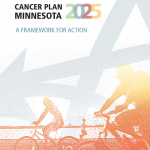 Clinical trials are underway that have shared goals with Cancer Plan Minnesota 2025.
Clinical trials are underway that have shared goals with Cancer Plan Minnesota 2025.
Written by: Heather Kehn, Cancer Care Delivery Research (CCDR) Program Manager with Metro-Minnesota Community Oncology Research Consortium (MMCORC).
The Metro-Minnesota Community Oncology Research Consortium (MMCORC) is a nonprofit research program sponsored by the National Cancer Institute (NCI) and participating hospitals and clinics. Local physician have access to the newest advances in cancer research. The MMCORC links community cancer specialists, primary care physicians and other health care professionals to NCI-approved research studies, called clinical trials. MMCORC, formally Metro-MN CCOP, has been a long time member and partner with the Minnesota Cancer Alliance. Several clinical trials open for patient enrollment throughout MMCORC’s 22 consortium member sites are working towards the same goals of the Cancer Plan Minnesota 2025. By working together, we can accelerate results.
Here are just a few examples. To find out more, call 952.993.1517 or explore www.mmcorc.org.
MN Cancer Plan Objective 4: Lung Cancer Screening
Research Study: Implementation of Smoking Cessation Services within NCI NCORP Community Sites with Organized Lung Cancer Screening Programs. This study will evaluate a multi-faceted training program to improve short-term smoking cessation rates (<14 days post-visit) and short (3 months) and sustained abstinence (6 months) among 1,114 enrolled smokers who present for LDCT lung cancer screening in 26 community-based practices, including Ridgeview Medical Center, Waconia, Minnesota.
MN Cancer Plan Objective 6: Patient Navigation & Health Equity
Research Study: Improving Resection Rates Among African-Americans with NSCLC (Non-Small Cell Lung Cancer). The study is a randomized trial to evaluate the impact of a nurse-led patient navigation intervention in improving rates of receipt of lung-directed therapy with curative intent (LDTCI) among African Americans with early stage lung cancer. Study sites are cluster-randomized to either the usual care study arm or the to the navigation intervention study arm.
MN Cancer Plan Objective 8: Financial and Legal Burdens
Research Study: Implementation of a Prospective Financial Impact Assessment Tool in Patients with Metastatic Colorectal Cancer. This clinical trial studies the use of the financial impact assessment tool in patients with colorectal cancer that has spread from the primary site to other places in the body. Gathering information about patients with colorectal cancer over time may help doctors better understand the financial impact of cancer and help patients avoid financial problems during treatment.
MN Cancer Plan Objective 13: Obesity
Research Study: Breast Cancer WEight Loss Study (BWEL Study). This randomized phase III trial studies whether weight loss in overweight and obese women may prevent breast cancer from coming back (recurrence). Previous studies have found that women who are overweight or obese when their breast cancer is found (diagnosed) have a greater risk of their breast cancer recurring, as compared to women who were thinner when their cancer was diagnosed. This study aims to test whether overweight or obese women who take part in a weight loss program after being diagnosed with breast cancer have a lower rate of cancer recurrence as compared to women who do not take part in the weight loss program. This study will help to show whether weight loss programs should be a part of breast cancer treatment.
To learn more about clinical trials, go to National Cancer Institute (NCI) website: Video Playlist—Understanding Clinical Trials

